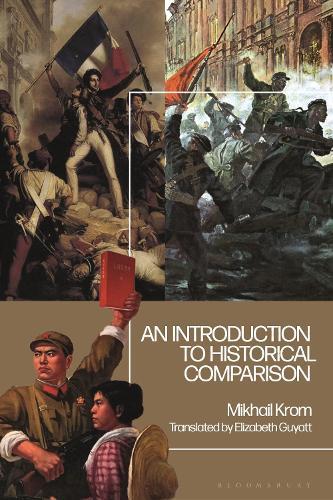Overview
Historical comparison as a method of historical analysis goes back to Herodotus in antiquity, yet it was not until the 1920s through the work of historian Marc Bloch that it was recognised as a solid historical method. Even today, some historians are wary of applying a comparative lens to their work. Why is this, Mikhail Krom asks, when historical comparison can be an incredibly insightful approach to history? Designed as a helpful resource for historians, An Introduction to Historical Comparison aims to teach scholars how to develop the skills needed to successfully employ a comparative methodology. It begins by tracing the intellectual history of comparative history writing and then examines the practice of historical comparison. The result is a clear and engaging analysis of historical thinking and a useful guide to main methodological techniques, successes, and pitfalls of comparative research. An Introduction to Historical Comparison is the first comprehensive study of the theory and practice of comparative-historical research. Combining a wide range of case-studies from the best practitioners of historical comparison with an innovative interdisciplinary perspective, this book is thus a meaningful contribution to current debates on historiography. As such, this resource will be of immense value to both students reading historiography and methodology and to historians looking to apply a comparative approach to their own research.
Full Product Details
Author: Dr Mikhail Krom (European University at St. Petersburg, Russia) ,
Elizabeth Guyatt
Publisher: Bloomsbury Publishing PLC
Imprint: Bloomsbury Academic
ISBN: 9781350202115
ISBN 10: 1350202118
Pages: 168
Publication Date: 28 July 2022
Audience:
College/higher education
,
Tertiary & Higher Education
Format: Paperback
Publisher's Status: Active
Availability: Manufactured on demand

We will order this item for you from a manufactured on demand supplier.
Reviews
Mikhail Krom has been a pioneering thinker in historical methodology for decades in Russia, and in this book he blazes new trails in the method of historical comparison. Krom both defines the method and shows its power to analyze and explain key problems in society, economics, and politics. This book should get historians thinking about their craft in new and fruitful ways. * Russell E. Martin, Professor of History, Westminster College, USA * Mikhail Krom’s crisp, accessible book introduces readers to the competing definitions, approaches, and intellectual benefits and pitfalls of historical comparison. The book’s coverage is impressive. It is historically deep, but at the same time, fresh and up-to-date. It has much to teach anyone interested in historical methodologies. * Valerie A. Kivelson, Thomas N. Tentler Collegiate Professor and Arthur F. Thurnau Professor of History, University of Michigan Ann Arbor, USA *
Mikhail Krom has been a pioneering thinker in historical methodology for decades in Russia, and in this book he blazes new trails in the method of historical comparison. Krom both defines the method and shows its power to analyze and explain key problems in society, economics, and politics. This book should get historians thinking about their craft in new and fruitful ways. * Russell E. Martin, Professor of History, Westminster College, USA * Mikhail Krom's crisp, accessible book introduces readers to the competing definitions, approaches, and intellectual benefits and pitfalls of historical comparison. The book's coverage is impressive. It is historically deep, but at the same time, fresh and up-to-date. It has much to teach anyone interested in historical methodologies. * Valerie A. Kivelson, Thomas N. Tentler Collegiate Professor and Arthur F. Thurnau Professor of History, University of Michigan Ann Arbor, USA *
Author Information
Mikhail Krom is Professor of Comparative Studies in History at European University at St. Petersburg, Russia. He is the author of Historical Anthropology (2010) and The Widowed Tsardom: The Political Crisis in Russia in the 1530s and the 1540s (2010). He is also the editor of History and Anthropology: Interdisciplinary Studies at the Turn of the 21st Century (co-edited with David Sabean and Gadi Algazi, 2006) and The Routledge Handbook of Maritime Trade Around Europe 1300-1600 (co-edited with Wim Blockmans and Justyna Wubs-Mroziewicz, 2017). Elizabeth Guyatt has translated from Russian since living and working in Moscow in the 1990s. She chaired the Translating Division of the Chartered Institute of Linguists from 2016-2018.




